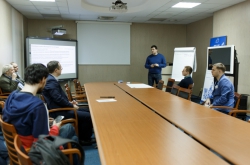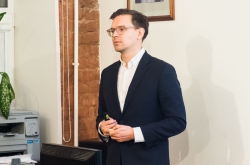NTI Competence Centers: the technological areas of the program
The NTI program of Competence Centers’ state funding was launched in 2017. Its goal is to overcome technological barriers to the leadership of Russian companies in global NTI markets. The program’s realization is supervised by the Russian Venture Company.
In 2017-2020, the Russian government will provide the country’s universities and research centers with 7.8 billion rubles (about $130 million) of funding. These funds are to be distributed between different comprehensive R&D projects, rights management and intellectual property protection operations, NTI markets-oriented educational programs, as well as initiatives aimed at the developing the informational, scientific and innovative infrastructures of NTI.
The first competition within the program’s framework took place in late 2017. Four NTI centers were identified at that time: two were based in universities and the other two – in scientific organizations.
This year an additional competition was held to increase the number of "end-to-end" technologies. The selection started in March 2018. Applications were submitted in eight categories, including the technologies for Big Data storage and analysis, blockchain technologies, wireless technologies and the "Internet of Things", technology components of robotics and mechatronics, sensor technologies, quantum communication technologies, electric power transmission technologies and distributed intelligent power systems, and machine learning and cognitive technologies.
The universities and scientific organizations could apply for the second competition until March 31, 2018. In total, 49 applications were submitted for the additional competitive selection. A special committee formed by the Ministry of Education and Science of the Russian Federation determined the winners according to several criteria, like the relevance of the proposed research activities and educational programs or the economic sustainability of their economic model.

A prerequisite for the application was creating a consortium of both representatives of business and educational and scientific organizations. Such members should be involved in the Center’s activities; for one, they should assess particular projects and development fields with regard to their commercialization prospects.
The selection winners will receive grant funding for research initiatives and educational programs. The results of the competition were announced at the end of April; ITMO University won in the “Machine learning and cognitive technologies” category.
National Center for Cognitive Technologies
Machine learning and cognitive technologies are a combination of methods and tools for creating systems that are capable of learning, facilitating decision-making and making decisions, as well as ensuring the development of human abilities to cope with creative and cognitive tasks at times when the available information is uncertain or incomplete. For one, such systems can be used for relieving human specialists of routine tasks, managing complex facilities and processes in conditions of limited resources and time, handling large amounts of complex data, and creating interactive digital information space.
This field is based on a cluster of supporting technologies. These include self-learning and self-organizing formal systems (including neural networks and multi-agent systems), support and decision-making systems based on the analysis and synthesis of data and knowledge (recommendation systems and predictive modelling systems), as well as areas that deal with predicting user actions, personal assistants, audio and video image recognition programs, game AI, virtual reality, and much more.
In the years to come, these technologies will play a fundamental role in creating new products and services in the NTI markets, notes Alexander Boukhanovsky, Head of the School of Translational Information Technologies and Chief Research Associate at ITMO’s eScience Research Institute.
He adds that ITMO University already has sufficient groundwork for development and advancement of cognitive technologies. During the last several years, the university’s researchers have published more than 250 WoS/Scopus recognized articles on the topic, and the total investments in machine learning and cognitive technologies research amount to more than 1.4 billion rubles. Various units of ITMO University conduct research in this area, for example, the departments that focus on computer technologies, speech technologies, and high-performance computing, as well as the eScience Research Institute which excels at software development and features an effective marketing infrastructure for commercializing high technology products.
The existing advances in this field, as well as the already established ties with research and educational organizations and industry, allowed the university to found a consortium of 18 companies, universities and science centers. Members of the consortium form the ecosystem of the National Center for Cognitive Technologies. Its main tasks are uniting the efforts of key participants of the NTI markets for conducting R&D projects, implementing educational programs on training in the field of machine learning and cognitive technologies, developing a mechanism for evaluating and certifying these technologies, and creating the associated infrastructure.
National Center for Cognitive Technologies
The tasks of the consortium members are clearly allocated and connected to the project’s field of focus. The “initiators”, i.e. the ones setting the tasks, represent the markets’ content aspects and initiate breakthrough research and development. This category includes a number of leading Russian companies including MTS, Mail.ru, Gazpromneft, National Center of Informatization (Rostec subsidiary) of Companies, and several others.
Developers or co-executors (Keldysh Institute of Applied Mathematics, Institute for System Programming of the Russian Academy of Sciences, and others) implement the projects of the National Center for Cognitive Technologies using their own facilities.
Disseminators broadcast and apply the results of the center's activities in the educational sphere. Amongst them are ITMO University, the National Center for Electronic Education (Rostec), as well as a number of other major Russian universities, for example, N. I. Lobachevsky State University of Nizhny Novgorod, Far Eastern Federal University, Moscow State Technological University “Stankin“, and others.
The potential users of the project’s solutions are also part of the consortium (The Federal Testing Centre, CenterProgrammeSystem, Distance Medicine, Genotec and others), as well as investors, including Vnesheconombank, Cifra, Skolkovo Foundation, Saint Petersburg Technopark and others.
Ten key projects of the National Center for Cognitive Technologies
The Center’s program is designed for a term of five years(2018-2022). During this time, it is planned to solve a number of applied problems from the field of machine learning and cognitive technologies. For now, the authors of the programme have already singled out ten key application projects, which the consortium will focus on. Each project has a team of ITMO researchers, as well as a group of companies, scientific and educational centers, whose task is to form the external ecosystem.

“Initially, we set the goal to consider the development strategy of the center not from the products’ point of view of, but rather with regard to strategic technologies that could be applied in different areas. These technologies will make it possible to overcome technological barriers, that is, objective limitations that make it difficult to translate research results into practice. One of the main barriers in this field is the lack of systematization, methods and criteria for assessing quality”, says Alexander Boukhanovsky. “This means that, firstly, we need to develop a theoretical base for a unified description of technologies at all stages of their life cycle, secondly, to provide for their practical capabilities that cover the needs of a wide range of applications, and finally, make all of this applicable to different fields. Ultimately, we are developing a united program of indirectly related subprojects with their own initiators, executors, and disseminators, who will teach students and consumers who then, in turn, will buy and use the product”.
Almazov National Medical Research Center, for example, has initiated a project dedicated to intellectual technologies of P4 medicine (Personalized, Preventive, Predictive, Participatory). Its goal is to develop, test and implement a set of solutions for medicine that can cover the full cycle of medical care at various scales - from decision-making in emergency operations to ambulant patients management. The project involves creating a technology for processing and interpreting medical images from various sources, as well as developing methods for personalized drug selection and drug design based on genomic sequencing data.
ITMO University already cooperates with the Almazov Center on a number of projects. Two years ago, its specialists, together with eScience Research Institute, have started working on a software system for ambulance fleet control in St. Petersburg. Its main goal is to assess the factors on which the patient's hospitalization depends (for more information on how information technologies already help to optimize the work of the medical center, click here).
Other projects implemented within the research focus of the National Center for Cognitive Technologies include the creation of intelligent next-generation biometrics technologies, scalable conversational intelligence technologies (including, for example, targeted chatbots), new generation cognitive educational technologies (for example, multimodal systems for measuring professional competences), intelligent technologies of transport of the future and a number of others. A wide range of projects and technologies makes the initiative attractive for a number of areas - from industrial production, transport, agriculture and mining to social services, education, healthcare, retail, marketing and entertainment, adds Alexander Boukhanovsky.
“Despite the seeming variety of tasks for different fields, they are all interdisciplinary and can be boiled down to understandable everyday questions, like “What is the best life-cycle of my object?”, ”How do I make employees happy and productive at the same time?”, “How can to increase profits and minimize risks?”. The tasks are solved comprehensively with the help of information technologies and with regard to knowledge on human behavior, decision-making, and thinking. In this case, we are talking about imitating (rather than directly modeling) thinking processes. The meaning of machine learning is not to teach the machine to think like a human being, but to artificially recreate the human thinking techniques of processing and interpreting information that cannot be described by formal cause-effect models”, he says.
Each subproject presupposes several independent results. According to the Center’s program, the end of each year will signify the production of specific intellectual property objects for more than one customer. At the first meeting of the consortium, the participants will determine the order of the projects’ completion according to the initiators’ objectives and will start working on new solutions.
Educational initiatives
Another important Center's activity will be the promotion of education in the field of machine learning and cognitive technologies.

"The purpose of any NTI Center is to solve three key tasks. The first one is to overcome technological barriers, which can only be done through proactive research and development. The second is to create the conditions and technologies in order to saturate the NTI markets with new products. And finally, the last one is aimed at providing business with personnel that can effectively use and develop such products”, continues Alexander Boukhanovsky. “Therefore, in addition to its research activity, the National Center for Cognitive Technologies also promotes education. We set ourselves the task to train a truly large number of specialists in the field of cognitive technologies. By the end of the planned stage of the Center's work, we expect to train 6500 specialists of highest qualification. In order to fulfill this task, as you understand, we need to cooperate with our partner higher educational establishments".
On the one hand, the Center will train IT specialists in the field of machine learning and cognitive technologies, and on the other hand, it also considers the possibility of creating network programs at the intersection of different subject areas and cognitive technologies. That is why the consortium united universities that specialize in not just information technologies. Graduates and postgraduates studying at the consortium's higher education institutions will be able to take part in the scientific projects implemented within the framework of the Center's program from their first year of studying.
Infrastructure initiatives
Finally, the third activity area of the National Center for Cognitive Technologies will be creating the necessary infrastructure for the systematic development of machine learning and cognitive technologies in Russia. As noted by the developers of the Center's program, such an infrastructure cannot currently be formed by using the solutions available on the market. That is why it is planned to launch three technological projects in three key fields: "data", "computing" and "digital platform". These projects are to be carried out alongside with the key scientific projects of the Center and use their results for solving infrastructure-related problems.
"The Center should not only carry out its own R&D projects, but also help other organizations with that. In order to do this, it is first necessary to foster the right skills for the implementation of such projects”, says Alexander Boukhanovsky. “In the field of cognitive technologies, this is essential for ensuring the validability and replicability of the developed methods and technologies, which requires reference data sets on various application fields. Therefore, our aim is to create an infrastructure for storing and processing big data, for both the system itself and its saturation."
In order to study and validate different technologies, we need tools that can create digital images of objects and systems. It is like a "virtual world" in which it is possible to safely experiment with various methods, models and algorithms. Therefore, our task is to create a supercomputer environment for working with virtual testing platforms, which will help to simulate large-scale real-world processes and test various objects and systems.

In addition, the Center will develop a digital platform, which will be a next generation system for project management in the field of cognitive technology and machine learning. According to Alexander Boukhanovsky, specialists of ITMO University have an opportunity to use existing groundworks and ideas for implementing such large-scale projects as part of the Center's work. In addition, certification methods in the field of cognitive technologies and machine learning will be solved. This goes for both the certification of the developments and the specialists engaged in this field.
Translated by Pavel Vorobyev




